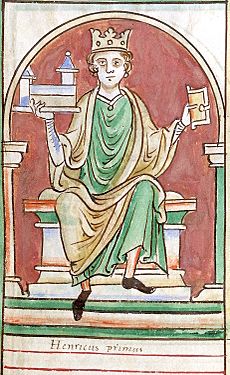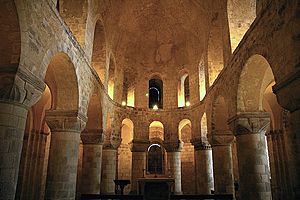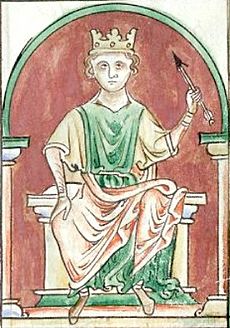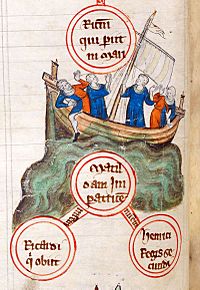Charter of Liberties facts for kids
The Charter of Liberties, also known as the Coronation Charter, was a special written promise made by Henry I of England. He issued it in 1100 when he became king. This document aimed to make sure the King followed certain rules. These rules were about how he treated important nobles, church leaders, and regular people. Historians in the 1800s saw it as a very important document in English legal history. They also saw it as an early version of the famous Magna Carta.
The Charter was created to fix problems caused by the previous king, William II of England (Henry's brother). Nobles felt William II had too much power. He taxed barons unfairly and misused church properties. He also allowed practices like simony (buying church positions) and pluralism (holding many church jobs at once).
For a long time, kings mostly ignored the Charter of Liberties. But in 1213, Stephen Langton, the Archbishop of Canterbury, reminded the nobles about it. He told them their freedoms had been promised over a century earlier in Henry I's Charter.
Why the Charter Was Needed

Henry I of England was nicknamed Beauclerc, which means "good scholar." He was the fourth and youngest son of William I of England (also known as William the Conqueror). Henry was well-educated and could read and write Latin. He also knew a lot about English law.
Henry's father gave him 5,000 pounds of silver but no land. Henry used this money to buy land in Normandy from his brother, Robert Curthose. Robert had inherited Normandy from their father but needed money. Henry faced some political troubles in France. His brother, William II of England, who was King of England, even imprisoned Henry for two years.
In 1096, Robert left Normandy to go on the First Crusade. Henry promised to be loyal to William, who then took control of Normandy. On August 2, 1100, William was killed in a hunting accident. Henry was there on this hunting trip. With William dead and Robert away, Henry quickly claimed the English crown.
Right away, Henry faced three big problems:
- The powerful earls and barons didn't fully accept him as king.
- The Church was against him, especially Anselm of Canterbury, the Archbishop.
- The native Anglo-Saxon people were not happy with the new king.
Henry worked to solve these problems. He made promises to the Church and made peace with Archbishop Anselm. He also married Matilda of Scotland, who was part Anglo-Saxon. This made the Anglo-Saxons much happier. She changed her name to the Norman Mathilda. However, the nobles were not pleased with his choice of wife. Henry needed to calm down the nobles and make his claim to the throne stronger.
William II, Henry's brother, had also issued a charter in 1093 when he was very sick. That charter's exact words are lost. People believe it freed prisoners, forgave debts, and promised to keep good laws. But William broke these promises as soon as he got better.
Henry went further than William. He talked with the most important barons and earls. He made many promises to them. Once everyone agreed, this agreement was written down as the Charter of Liberties.
What the Charter Said

The Charter of Liberties began with a traditional greeting. Then, it listed fourteen main promises. Here's a simple summary of what Henry I promised:
- I, Henry, now King of England, will not take or sell Church property when a bishop or abbot dies. I will wait until a new leader is chosen. I will stop all unfair practices that have harmed England.
- If a baron or earl dies, their children will not have to pay a lot of money to get their inheritance. They will get it fairly, as is the law.
- Any baron or earl who wants to arrange a marriage for his daughter or other female relatives should talk to me first. But I will not stop a sensible marriage. Any widow who wants to remarry should also talk to me. I will respect her family's wishes. But I will not let her marry someone who is my enemy.
- A baron's wife who becomes a widow will keep her dowry (property she brought into the marriage). She can remarry if she wishes, as long as it's a proper marriage. Barons who look after the children of a dead baron must manage their land and money fairly.
- I will stop common taxes collected in cities and counties that were not collected during the time of King Edward the Confessor.
- I will cancel all debts and legal claims that were owed to my brother, unless they were part of a lawful inheritance.
- If any of my barons becomes very ill and gives away money or property, these gifts will be respected. But the heirs must be remembered properly. Gifts given by sick barons under pressure will not be allowed.
- If any of my barons commits a crime, he will not have to pay a special fee to the crown, as happened with my father and brother. Instead, he will be judged by the old laws and customs from before my father's time. He will make amends as needed. Anyone guilty of treason or other serious crimes will make proper amends.
- I forgive all murders that happened before I became king. Any murders that happen after I am crowned will be judged by the Crown's justice.
- With the agreement of my barons, I will protect all the forests as was done in my father's time.
- Knights who provide military service and horses will not have to give me grain or other farm goods.
- I will bring strict peace to the land and order everyone to keep it.
- I will bring back the laws of King Edward and the changes my father made with the advice of his barons.
- Anything taken from me after my father's death must be returned immediately, without a fine. If it is not returned, a heavy fine will be charged.
This agreement was witnessed by many important people, including bishops and earls, in London when I was crowned. Farewell.
What Happened After

William the Conqueror admired the laws of Edward the Confessor. He had changed many laws to make Edward's laws the common law of England. At the same time, he wanted to establish strong Norman rule. During the entire Norman period, not many new laws were made.
Henry started his reign with the Charter of Liberties. This sent a strong message: he was returning to his father's ways, which people remembered fondly. The unfair actions of William II were supposed to end. The corruption and unfair fees for inheritances, guardianships, marriages, and murder fines were to stop. Debts and past crimes were to be forgiven. The king's lands and military tenants were to be freed from certain taxes. Most importantly, the "Law of Edward" (as changed by William I) would be brought back. It was assumed that the barons would give the same promises to their own tenants as the king had given to them. This good will likely did spread down the chain of command. The Charter was not a new law itself. It was a promise to return to the laws as they were under William I, before William II had changed them unfairly.
However, the promises made in the Charter were hard to enforce. There is much proof that Henry I often ignored them. Records from 31 years into Henry's reign show he had made the Crown's power much stronger than the Charter allowed. The creation of the Exchequer (a treasury department) was meant to stop corruption in tax collection. But it actually gave the king more power. Henry's chief minister, Bishop Roger of Salisbury, made the laws for important tenants very strict. This happened slowly, setting new rules over time.
Early in his reign, Henry did issue a command that local courts should be held as they were in Edward the Confessor's time. This helped combine old traditions with newer Norman methods. Writers of that time said Henry made laws about theft. He brought back capital punishment (death penalty) for many crimes. He also dealt harshly with people who made fake money and his own courtiers who demanded too much from people. Henry made his traveling court and army feared everywhere.
The drowning of his son, William Adelin, in the White Ship in 1120, led to the end of the Norman royal family. Stephen of England claimed the throne in 1135. He was the last Norman king. His fight with Henry's daughter Empress Matilda led to a period of civil war called The Anarchy.

Historians see the Charter of Liberties as an early step towards later laws. There weren't many formal laws under the Saxons or Normans. The Charter was a big promise made because of political needs. Many parts of the Charter were about stopping practices that were unfair and caused political problems. Various feudal fees, instead of being random, were said to be reduced to "reasonable" limits. The Charter led to a lesser-known rule by Stephen (1135–1154). This rule stated that if there was no son, daughters could inherit land. This was very unusual for its time. It happened before similar changes by Henry II of England.
Problems with the Church had been growing for some time. William I had tried to appoint bishops himself. But Pope Gregory VII in 1075 said that church leaders should be chosen by the Church, not the state. A long struggle followed. This was still happening when Henry I became king. He had a conflict with Archbishop Anselm. This conflict was helped by a church lawyer named Ivo of Chartres. They agreed that Henry could watch the selection of bishops but not interfere. This agreement spread across Europe by 1122. The Concordat of Worms in 1122 didn't completely end the tension between Church and State, but it changed how they interacted.
Henry I's government at Palace of Westminster became very effective. The Norman way of governing needed a strong leader. Stephen was not strong enough. Henry's death was seen as a great tragedy for many centuries:
Then there was trouble in the land, for everyone who could robbed others...He [Henry I] was a good man, and people greatly respected him. No one dared to do wrong against another in his time. He brought peace for people and animals. If someone carried gold and silver, no one dared to say anything bad.
During Stephen's reign, Henry I became known as the "Lion of Justice."
The Charter of Liberties set an example for the Magna Carta (Great Charter) of 1215. That document was issued at the end of the reign of John of England.
 | Selma Burke |
 | Pauline Powell Burns |
 | Frederick J. Brown |
 | Robert Blackburn |

